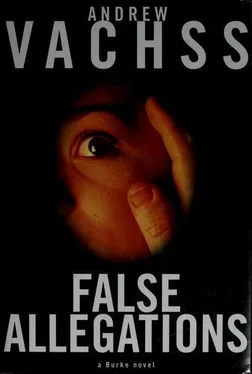"You don't always have videotapes."
"No. And there seems to be no question but that charlatans with agendas of their own can implant memories. Especially when the subject is in a highly confused state. Or drug–impaired. Or suffering from a delusional disorder. With certain disorders, there is an enormous need to confabulate. Do you know what that—?"
"Fill in the blanks," I said. "Some people lose time. They can't account for whole blocks of it, sometimes even weeks. It's scary to them."
"Multiple personalities especially," Kite said, an intensity to his voice. "But they test perfectly. A multiple would survive any conventional psychological screen. The MMPI, for example. That could explain accounts of alien abductions."
"Multiples who need to fill in the missing time?"
"It could be; that's all I can commit to at this time. But it remains a possibility, one that cannot be discounted."
"You think she could be a—?"
"No. She's been tested. And there's other evidence."
"Such as?"
"We took her down the same road."
"Hypnosis?"
"Sodium amytal. She went right back to it. We had her in the room. Brother Jacob's room. When she was a little girl. She even remembered his cologne."
"A twelve–year–old girl knew his—?"
"Not the name," Kite said, anticipating, "the smell. She described it. And the next time, we brought samples, a whole variety. She picked it right out."
"It happened a long time ago," I said. "Can you—?"
"We know we have a statute problem," Kite interrupted, answering the question he thought I was going to ask. "New York has been a strict jurisdiction, very hostile to delayed discovery."
"What's delayed discovery?"
"Ah," he said, changing tone, finally on ground where I didn't know the way. "The analogy is to medical malpractice. An operation is performed and a surgical instrument is left inside the patient. She doesn't discover the error until a long time later. Perhaps when she has other medical problems as a result. The statute of limitations doesn't begin to run until she actually knows malpractice was committed."
"But Jennifer did know…"
"She knew it when it was happening, yes. But the perpetrator's own conduct—the shock of the sudden knowledge that she was a victim—literally drove it out of her mind. She was in a psychiatric coma. She didn't discover it until later. And that's another doctrine we plan to utilize: equitable estoppel. It simply means a wrongdoer cannot profit from his own bad acts. Do you understand?"
"I hit someone in the head with a tire iron. He goes into a coma. Years pass, he's still in a coma. The statute of limitations runs out. He wakes up. Remembers it was me who did it. It was me who took his memory, so I don't get a free pass for doing it."
"Yes! Not the most graceful explanation, but certainly a cogent one."
"But that was physical ," I said. "This was…"
"Emotional. Of course. The hardest thing to prove in law is the so–called soft–tissue injury. Any lawyer representing a car accident victim would rather have a broken finger than the worst whiplash. And the human heart is the softest tissue of all," Kite intoned in that jury–summation voice.
"So how are you going to…?"
"Laws change," he said. "Some cases actually make law. I have never heard of a better case to prove the viability of the 'delayed discovery' doctrine than this one. And times are changing. Many states recognize that a child may not have the internal resources to come forward in a case of sexual abuse, especially when the perpetrator is a powerful figure in the child's life. Connecticut has already extended the statute. So has Vermont. And California. I don't fear the odds. In fact, I look forward to the opportunity."
"Okay. You said there was other proof. Could I—?"
"Take this with you," he said, handing me a pile of paper. And a bunch of letters, neatly tied in a black ribbon. I put them into the aluminum case.
At the grille, Heather said goodbye in a soft voice. When I turned toward her, she put her forehead against my chest, whispered, "Could I have another chance?"
"Who knows?" I lied.
Ididn't want to use my Arnold Haines ID for a plane ticket, in case something went wrong out of town. And I knew better than to pay cash. Michelle booked me a round–trip on USAir through a travel agent she knows. Now that the federales finally figured out that any crew of drooling dimwits with a rental van and enough money to buy a few tons of fertilizer can level an entire office building, they want photo ID at airports. What they haven't figured out is that anyone with the coin and the contacts can score a complete set of papers in a couple of days. When I showed the uniformed woman at the ticket counter a driver's license that matched the Stanley Weber name on my first–class ticket, she didn't give it a second glance.
I couldn't contract the job out, not in Buffalo. In a few cities, you still have old–time thieves working. Guys who'll do a house as fine as pouring it through a strainer and turn over whatever they find—never even look at what they lift, much less make copies. The old–timers have a professional's pride: "If I take a fall, I take it all," the Prof used to say—no rats allowed in that exclusive club.
But those kind of burglars are a dying breed. Hell, burglary itself is a dying art. Today, it's mostly smash–and–snatch punks, junkies and fools, amateurs who think a fence is what you climb over to get to the windows…which you break with a brick. They don't know how to bypass an alarm, don't even know enough to start at the bottom with a chest of drawers. They leave their trail like it was blazed in neon, counting on the cops' being too busy to do anything but give you a complaint number for your insurance report. And if they ever run into a dog, all they're going to get is bit.
There're no standards now, the way there used to be. I remember a guy who wanted to join our crew years ago, when we were stealing all the time. Hercules, we'd called him in prison, a big, handsome kid, strong as the stench from a two–day–old corpse. He had a deep weakness for the ladies, but he was stand–up—if he got popped, he'd go down by himself, the way you were supposed to. Still, the Prof had nixed him off. "He's a stone amateur, bro—gets his nose open like a subway tunnel. Never keeps his mind on business. Old Herc, he's a hopeless pussy–hound. The boy can't run with us—he's a rooster, not a booster."
So I was never tempted, always stayed with a true–pro crew even if I had to pass up something that looked luscious. And I can still get it done in a few cities. Chicago has one of the best thieves I've ever known, almost in the Prof's class. There's a real slick guy who works San Francisco, one of those small, compact boys who can move like smoke. And in New Orleans, there's a double–jointed woman who could find a diamond in a vat of zircons with her nose. But they're few and far between, an aging class. And every prison jolt thins the ranks.
In Buffalo, I didn't know a soul. I wasn't going to trust some secondhand recommendation—and without a local bondsman and a good lawyer already lined up, it's not righteous to ask your own people to take a risk.
Besides, whatever Brother Jacob had lying around that might help me was probably in his head, not in some desk drawer. I decided this was a one–thief job.
The flight took under ninety minutes, nonstop. I fly first class because it's more anonymous. The seats are separated—the whole setup doesn't encourage the guy next to you to get into a conversation. And you can board the plane after everyone else but still be first off when you land. If you don't check luggage, you can slip on and off the plane like it was a taxicab.
Читать дальше











